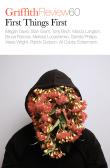AustLit
 4263133115610981254.jpg
4263133115610981254.jpg
Image courtesy of publisher's website.
Alternative title:
First Things First
Issue Details:
First known date:
2018...
no.
60
2018
of
Griffith Review
est. 2003-
Griffith Review
The material on this page is available to AustLit subscribers. If you are a subscriber or are from a subscribing organisation, please log in to gain full access. To explore options for subscribing to this unique teaching, research, and publishing resource for Australian culture and storytelling, please contact us or find out more.


